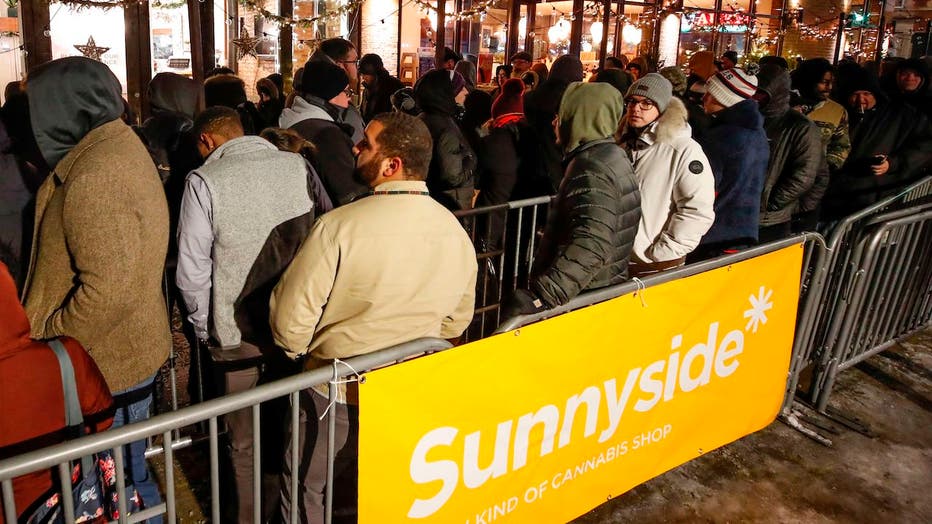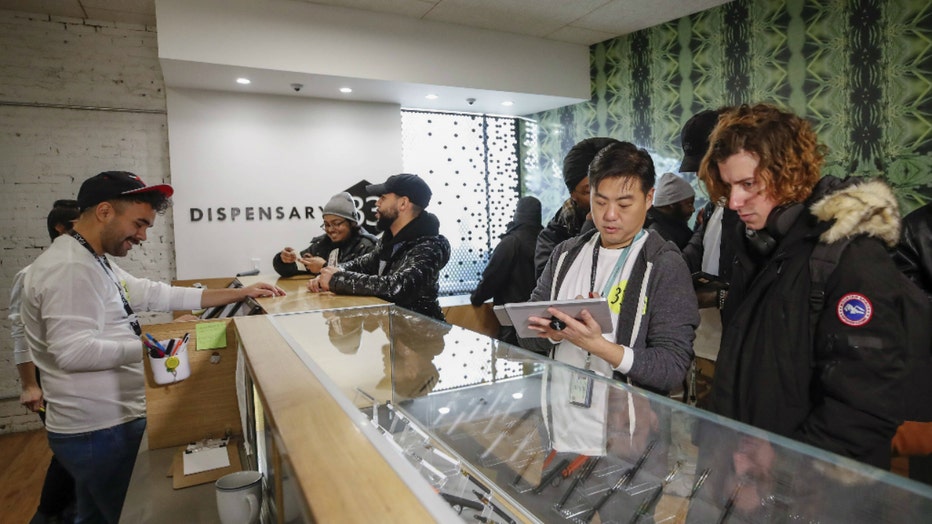Illinois recreational marijuana sales on fire in first year of legalization

Illinois recreational marijuana sales on fire in first year of legalization
Recreational marijuana is lighting up Illinois with unprecedented revenue, and the profit margin has plenty of room to grow.
CHICAGO - Recreational marijuana is lighting up Illinois with unprecedented revenue, and the profit margin has plenty of room to grow.
The first year of legalized recreational marijuana generated $1 billion in revenue. It's expected to be quadruple that by the time there are enough dispensaries to keep up with demand.
Who knew we'd be describing normal as this. Maskless Illinoisans waiting in line for weed.
But that's how we kicked off 2020 and many municipalities are ending it in the green when it comes to pot sales.

Customers wait in line outside Sunnyside Cannabis Dispensary to purchase recreational marijuana on January 1, 2020 in Chicago, Illinois. - On the first day of 2020, recreational marijuana became legal in Illinois, which joins 10 other US states with (KAMIL KRZACZYNSKI/AFP via Getty Images / Getty Images)
The entire downtown business district in Naperville, combined brings in 1.7 [million dollars]," Naperville Mayor Steve Chirico said. "So these three dispensaries would bring in more than our entire downtown business distrct."
Facing early resistance, three cannabis dispensaries opened in Naperville last fall. Even though they were late to the game, the sales tax revenue, the mayor says, will top $2 million for 2020.
Statewide, recreational and medicinal marijuana sales generated $1 billion last year.
"They've said all along that Illinois' expected to be between a $2-and-$4 billion market at maturity," said Jason Erkes, chief communications officer for Cresco Labs. "No one thought that a billion would be the first year. So it definitely exceeded people's expectations."

Customers shop for a recreational marijuana at Dispensary 33 store on January 1, 2020 in Chicago, Illinois. - On the first day of 2020, recreational marijuana became legal in Illinois, which joins 10 other US states with legal use of recreational mar
Eighty recreational pot dispensaries are operating in Illinois. The state has the capacity, Erkes says, to accommodate 500.
And local municipalies, like Naperville, are adapting by weeding out old ordinances that originally banned the substance.
"You could even make the argument that Scott's Miracle Grow sold at Home Depot is a marijuana or cannabis-related product and therefore can't be sold in our town, I mean that's how our ordinance was written. It was very, very broad. So we need to clean that up."
The types of products sold have also evolved. Long-gone are the days of hitting a bong to get high. Now people can take a sip, pop a mint or indulge with cannabis-laced caramels.

Illinois sees first legal sales of recreational marijuana
The sale of marijuana for recreational purposes became legal Wednesday in Illinois to the delight of pot fans — many who began lining up hours early at dispensaries.
"Right now what's really popular are microdosing, being able to take very small doses of cannabis throughout the day to get the medicinal benefits of it without really getting that high or euphoric affect," Erkes said.
Unlike the product shortages we faced in early 2020, Erkes says shops have had enough time to catch up with demand. And they're anticipating new customers as well.
"The cannabis consumer that comes into our stores, we have grandma's, we have teachers, we have business people. Really across the board so the stigma doesn't exist anymore," Erkes added.
Marijuana is now legal in 35 states. Fifteen allow recreatinal use.
President-elect Joe Biden has said he will support marijuana reform efforts to expand the industry. It may even gain full federal legalization.

